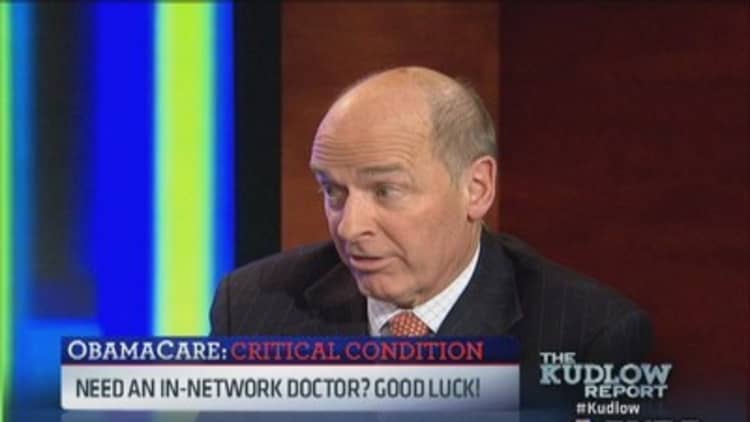
It's becoming an unfortunate by-product of President Barack Obama's health care reform: limited choice of doctor networks and hospital access. Why? Because the Affordable Care Act's subsidized health marketplaces are forcing insurers to drive down costs elsewhere.
Dr. Bill Grace, founder of Grace Oncology and an attending physician at Lenox Hill Hospital in New York, told CNBC Wednesday that Obamacare's access problems will ultimately force patients to receive lower-quality care.
"They're going to go to hospitals that are very hungry for patients. You're not going to see the best doctors, you're not going to get into the best institutions," Grace told Larry Kudlow on CNBC's "Kudlow Report."
(Read more: AOL changing its 401(k) benefits due to Obamacare)
"You're not going to get Cadillac care with Yugo payments," he added.
Kudlow asked whether Obamacare plans will actually start to look more like Medicaid, which many doctors don't want to accept because of its reimbursement rates, which are traditionally low to virtually nothing.
"Obamacare is looking like it's a little better than Medicaid, but Medicaid is so abysmal," Grace said. "Medicaid pays me $6 to do an hour and a half exam. If [Obamacare] pays me $10, that's still not going to cover my costs. So no one is going to want to take this kind of Yugo plan."
(Read more: Medicaid enrollment jumps)
The Wall Street Journal reports that in response to the growing access problem, some state legislatures are considering bills that would force insurers to expand their doctor and hospital networks. It's all an effort to limit the so-called doc shock, or preventing Obamacare enrollees from going to top-notch doctors or the physicians they currently see.
"Sixty percent of Americans are living paycheck to paycheck, and with Obamacare they're facing new shocks," Grace told CNBC. "The first shock is premiums are up 50 percent to 60 percent. Second is their deductibles have tripled, and that's caused people to not be able to meet their payments."
Thirty million people are "coming into the system who weren't covered before and we don't have enough primary care physicians to take care of them," he said, "so there is going to be gridlock."
—By CNBC's Ben Thompson. Follow him on Twitter @BenThompson00

